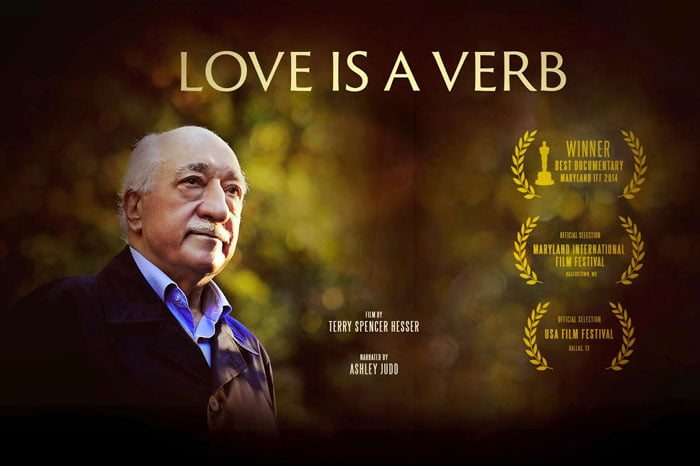Pacifica Institute Utah hosts ‘Love is a Verb’ screening for interfaith season

Date posted: February 28, 2015
MADDIE SWENSEN
SALT LAKE CITY — Pacifica Institute Utah sponsored a screening of the film “Love is a Verb” on Monday, Feb. 23, at the Salt Lake City Library as part of Interfaith Season sponsored by the Salt Lake Interfaith Roundtable.
Interfaith Season is a two-month celebration of all the different faiths in the Salt Lake valley. The Salt Lake Interfaith Roundtable works to promote cooperation by providing information and encouraging dialogue between different faiths.
Pacifica Institute Utah is the local chapter of a nationwide nonprofit organization of Turkish-American volunteers based in South Salt Lake. Members carry out projects promoting awareness of issues such as social welfare, education and poverty.
Andrew Coserok, a local sculptor, was at the event to share his personal feelings of the Gulen movement. Although not a member of the Pacifica Institute, he described the organization as “seem(ing) to exist solely to find excuses to be nice to their neighbors.”
“Love is a Verb” is a documentary highlighting the life and work of Fethullah Gulen, an Islamic scholar from Turkey. Gulen inspired the “Hizmet” movement, named for the Turkish word for service.
“Love is a Verb” has been nominated for awards at various film festivals throughout the United States and won Best Documentary Film at the Maryland International Film Festival.
The Hizmet movement, often called the Gulen movement, focuses primarily on education, interfaith and intercultural dialogue and humanitarian outreach.
“In these fields, the Hizmet movement exerts a considerable influence on the global society,” Coskun Kariparduc, a member of Pacifica Institute Utah, said in an email. “The participants of the movement have managed to establish educational institutes focusing on academic success and universal ethical values, humanitarian aid organizations that function wherever there is a disaster without distinguishing between races, and interfaith-intercultural dialogue institutes that establish bridges between diverse communities.”
According to the documentary, the first Gulen-inspired educational institute opened in 1980. As of 2009, it was estimated that 2 million students attend the 1,300 Gulen-inspired schools worldwide.
Hizmet’s humanitarian organization, “Kimse Yokm Mu?” which translates to “Is anybody out there?” carries out service projects across the world, bringing relief to the most impoverished places.
According to the documentary, the Gulen movement is often viewed negatively in Turkey, and as a result, a warrant was out for Gulen’s arrest, forcing him into self-imposed exile in Pennsylvania. When the Turkish government was reorganized, the warrant was suspended and Gulen was invited back, but he regretfully declined.
Prior to viewing the documentary, Coserok spoke to the audience about his personal feelings on the Gulen movement.
He expressed the fear and questioning he felt toward the Muslim faith after 9/11. Eventually, he came to the conclusion that he was going to approach this faith as he would want someone to approach his.
“Islam, as it is practiced today, is a beautiful rainbow of faith built on many of the same principles of my own (Christian) faith,” Coserok said. “Muslims love their children and want to do good in the world. In the Quran it says, ‘And if anyone save one life, it would be as if you saved the life of the whole world.’ ”
Wanting to learn all he could about Islam, he read the Quran, talked to his neighbors, emailed scholars about the faith and eventually met members of Pacifica Institute Utah and learned of the Gulen movement.
“Fethullah Gulen does not govern anyone or direct any efforts. He simply continues to show the truth of what he knows,” Coserok said. “And those who are able do good wherever they are. There is a beautiful truth in this, common to every faith but often lost to our jaded sight. When God answers prayers, many times it is by the hands of the good-hearted and the faithful.”
Source: Desert News , February 28, 2015
Tags: Dialogue | North America | Peacebuilding | USA |
























